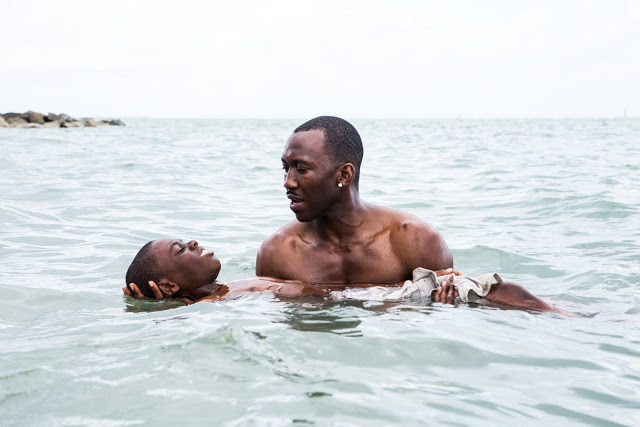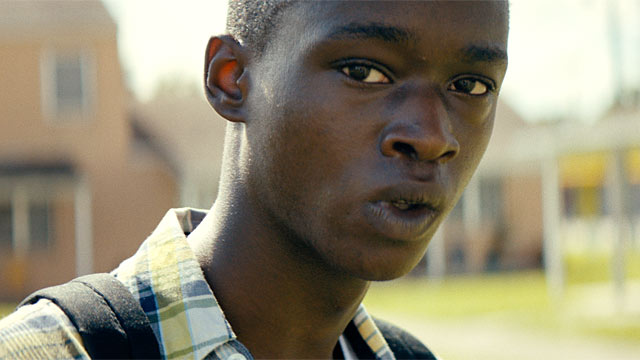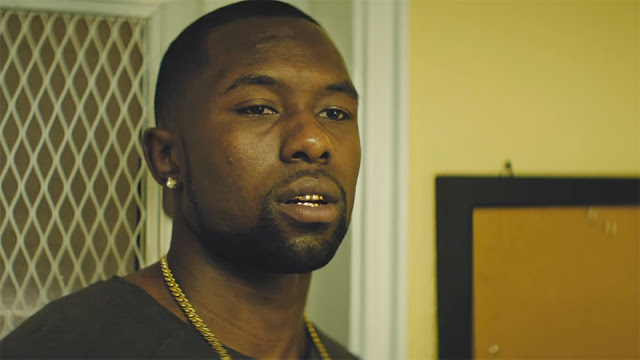A tender, piercing, achingly sad story of loneliness, Moonlight sneaks up on you. In empirical terms, it’s fairly modest: It is short, it was made on a limited budget, and it stars no high-profile actors. But as it progresses, this brittle, forceful film surreptitiously accumulates a startling amount of raw power. It doesn’t quite knock you out—it is too nuanced and compassionate to wield its intensity as a sledgehammer—but it still has the capacity to paralyze you.
Written and directed by Barry Jenkins from a story by Tarell Alvin McCraney, Moonlight chronicles the life of Chiron (pronounced shy-ROAN), a young, gay black man growing up in Miami’s impoverished Liberty Square. It unfolds as a series of cinematic chrysalides, considering Chiron at three different stages of growth. In the first, he is a scrawny nine-year-old derogatively dubbed Little (Alex Hibbert), suffering the abuses of local bullies and living in squalor with his crack-addicted mother, Paula (a heart-breaking Naomie Harris). In the second, he is a sullen teenager (Ashton Sanders), more self-assured but still subjected to the same violent rituals of prejudice and persecution. I will leave the details of the final phase of his metamorphosis to the viewer, except to say that Chiron grows into a puissant adult who now goes by the name of Black (Trevante Rhodes).
Where a typical storyteller might toggle back and forth via flashback, Jenkins presents these episodes in Chiron’s life as three distinct chapters, so that they inform one another but never bleed through chronologically. (In this, Moonlight would make a fascinating double feature with Certain Women, Kelly Reichardt’s contemplative drama that followed the lives of three women in Montana.) This rigidity allows each arc to acquire its own identity, both narratively and visually (Jenkins shot each sequence with a different film stock to create subtle differences in tone and color, similar to Danny Boyle’s approach in Steve Jobs). And curiously, Moonlight‘s first act is simultaneously its worst and best. Little is a sympathetic kid, and his predicament helps the movie work as a damning indictment of the drug epidemic and its pernicious effect on America’s poor. (Paula is a bad mother, but she isn’t a bad person—she’s just too busy getting high to worry about raising her son). But despite an affecting performance from Hibbert, Little never quite transcends his symbolic function as a victim. You feel sorry for him, but you don’t really know him.
Yet this flaw isn’t all that damaging, because the most compelling figure in Moonlight‘s opening episode isn’t Little at all—it’s Juan, a local drug-dealer, played with magnificent swagger and sorrow by Mahershala Ali. Juan is actually the first person we meet, cruising down the streets in a menacing muscle car, Boris Gardiner’s “Every Nigger is a Star” blasting from his stereo; when he exits the vehicle to check in with one of his enforcers, Jenkins’ handheld camera circles him in a fluid (and perhaps ostentatious) long take. Juan first encounters Little hiding from pre-teen toughs in an abandoned crack den, and he brings him to his handsome home in the suburbs, introducing him to his instinctively maternal girlfriend, Teresa (Janelle Monáe, nicely restrained). Soon after, Juan returns Little to his mother—he’s a drug-dealer, not a kidnapper—but Little repeatedly finds his way back to Juan’s house, and the two quickly develop an odd bond. The boy doesn’t talk much, but he grows to trust this massive man, to the point that one day, after Teresa plies Little with food, he quietly asks a three-word question: “What’s a faggot?”
That simple definitional inquiry stops Juan in his tracks, but it shifts Moonlight into another gear. (Little’s more personal follow-up—”Am I a faggot?”—is another gut-punch.) It is at this point, just before transitioning into its second chapter, that the movie transforms from a straightforward coming-of-age story into something richer, a complex tapestry of human emotion and self-discovery. And though the primary journey is Chiron’s, Juan’s stunned reaction to Little’s questions encapsulates this film’s pain and poignancy. Juan only appears in a handful of scenes, but Ali—best known as a smooth-talking lobbyist on House of Cards and recently breaking out as a crime lord on Luke Cage—imbues him with a gregarious charm that makes the ultimate crumbling of his defenses all the more devastating.
But again, this is Chiron’s story, and Jenkins never loses sight of that. It is tempting to read Moonlight as an allegory of marginalization, whether about race, sexual orientation, or any other characteristic that serves as a target for bigotry. Yet while Jenkins gently expands the movie’s scope as it progresses through its triptych, he makes sure to retain its intimacy. That’s most evident in Chiron’s intriguing, uncertain relationship with Kevin (played in the various segments by Jaden Piner, Jharrel Jerome, and The Knick’s André Holland, respectively), his seeming friend and potential romantic partner. In the film’s dreamiest, most charged sequence, the two teenagers share a sexual encounter on the beach, and for the first time, we see a glimmer of hope enter Chiron’s eyes.
That scene, which takes place under the stars, operates as a thematic and aesthetic bookend to an earlier sequence, shot in blinding sunlight, where Juan teaches Little how to swim. In both, Jenkins demonstrates a talent for crafting images of placid, lyrical beauty. Yet visually, Moonlight is something of a mixed bag. Jenkins favors a lo-fi style that nevertheless feels polished, and many of his handheld close-ups—most are of his actors’ faces, but some are more evocative, such as Chiron’s hand grasping a fistful of sand on that beach—boost the movie’s immediacy. But his freeform approach occasionally contributes to a sense of indiscipline, as does Nicholas Britell’s ragged, syncopated score. It’s easy to watch this film and long for the artistry of Carol, which complemented its soaring love story with ravishing technique.
That said, Jenkins’ restlessness is in keeping with a film that is always pushing forward, uncovering new kernels of truth about its hero. By the time Moonlight reaches its final act—which consists primarily of two conversations freighted with years’ worth of desire and regret—it has achieved a breathless urgency that belies its small scale. Impatient viewers may be inclined to complain that not enough happens in it. But few movies can do so little and, at the same time, make you feel so much.
Jeremy Beck is the editor-in-chief of MovieManifesto. He watches more movies and television than he probably should.



